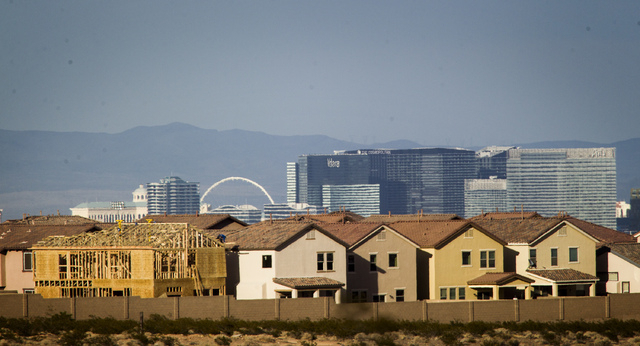National study: Las Vegas housing market least stable in U.S.
Las Vegas came in dead last in a study that measures the strength of U.S. housing markets.
Freddie Mac’s Multi-Indicator Market Index, released Wednesday, measures the stability of states and the U.S. capital, as well as the top 50 metropolitan areas. It weighs criteria including mortgage applications, income ratios and employment.
Nationally, the measure shows an improving housing market that’s still outside its healthy range, the McLean, Va.-based company said in a statement.
But the Las Vegas Valley’s slow recession recovery makes it the weakest market on the list.
That’s no surprise to Heidi Kasama, president of the Greater Las Vegas Association of Realtors.
“We were foreclosure central over here,” Kasama said.
But she expects Las Vegas to fare better on future Freddie Mac lists. She notes home prices went up 24 percent in both 2012 and 2013.
Stephen Brown, a professor and director of UNLV’s Center for Business and Economic Research, didn’t question the measure but said the unflattering picture is a little old now.
“It’s a very backward looking indicator,” Brown said. “It tells us what we already know.”
Joining Las Vegas as unstable markets are Atlanta, Orlando, Fla., and Chicago.
North Dakota, Washington, D.C., and Wyoming were the most stable U.S. housing markets, according to Freddie Mac.
“We’re making progress, we’re recovering but we’re not all the way there yet,” Len Kiefer, deputy chief economist at Freddie Mac, said in a phone interview.
“Some places are much closer and others have farther to go.”
The U.S. housing market has been healing for two years as the job market improves and competition for tight inventories fuels home-price gains.
The S&P/Case-Shiller index of property values in 20 cities increased 13.2 percent in the year through January, according to a report Tuesday.
Rising employment and income growth is bolstering many areas, Freddie Mac said.
The Freddie Mac measure assesses the stability of each market relative to its historical range, based on home purchase applications, payment-to-income ratios, local employment and the proportion of on-time mortgage payments.
North Dakota is benefiting from an oil boom that has driven up employment, personal income and residential real estate values.
Home prices climbed 39 percent from the end of 2006 through last year, according to the Federal Housing Finance Agency, avoiding the housing crash in the rest of the country.
The most stable metro areas as of January were San Antonio, Houston, and Austin in Texas, followed by New Orleans, according to Freddie Mac.
Contact reporter Cassandra Taloma at ctaloma@reviewjournal.com or 702-383-0264.
Bloomberg News reporter and Prashant Gopal contributed to this report.






















